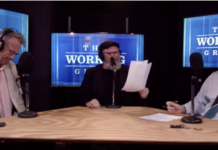A simple explanation of this week’s military and political developments in the Pacific
President Biden cancels Papua New Guinea visit and Quad summit
President Biden had a busy week planned in the Pacific next week. An historic visit to Papua New Guinea on 22 May and then on to Sydney for the ‘Quad’ or Quadrilateral Security Dialogue meeting with the leaders of Australia, Japan and India. Domestic budget concerns and a looming American debt crisis forced the President to cancel these visits and remain at home. However, Secretary of State Anthony Blinken will attend in his place and will also meet with leaders of the Pacific Islands Forum.
The President noted the importance of the Quad stating “The Quad is an important body and we want to make sure that it occurs at leadership level” and suggesting that there will be an opportunity for the leaders to meet informally at the G7 meeting in Hiroshima on 19 May. On 18 May, the White House issues a statement saying that President Biden would visit the Pacific later this year.
Both cancelled visits were important because they demonstrate America’s commitment to building strong relationships in the Pacific. The visits also contribute information about developing American collective security plans in the Pacific.
Papua New Guinea’s position is enormously important to Australia and the United State in any South West Pacific conflict because it provides a counter to potential Chinese bases in the Solomon Islands. Further, Xi Jin Ping, China’s leader has visited Papua New Guinea; and some will interpret President Biden’s cancelation of his visit as America not valuing Pacific relationships.
Papua New Guinean concerns over United States security agreement
On 17 May, Radio New Zealand reported concerns within the Papua New Guinean government about the proposed security agreement with the United States. The report highlighted local concerns about Papua New Guinea being drawn into Sino-American competition and contributing to further militarisation of the Pacific.
This concern is often raised by Pacific nations, and is understandable. New Zealand and most of the smaller Pacific Island nations are ‘nuclear free’ and generally want to stay out of major power conflict. However, there is a delicate balance to be struck because an unfortunate reality of international affairs is that regardless of whether a nation wants to be involved in conflict; sometimes there is no choice. Ukrainians would have been happy not to be fighting a war to defend their country. However, a hard reality is that the international rules-based order that protects the freedoms and sovereignty of smaller nations; is built upon military deterrence.
Unfortunately, if Sino-American competition increases smaller Pacific nations will be drawn into it. This means smaller Pacific nations need to be thinking now about the future. Whether they stumble into defence agreements late, with terms imposed upon them. Or; pro-actively engage and retain opportunities to negotiate and set their terms of engagement with major powers.
US Secretary of Defence proposes 40% increase in Pacific Deterrence Initiative budget
The Pacific Deterrence Initiative is a line in the United States Department of Defence budget. Speaking to the Senate Appropriations Committee last week, the Secretary of Defence, Lloyd Austin said that this year’s Pacific Deterrence Initiative budget request is for an increase of 40%; or an increase to $ 9.1 billion.
The Secretary did not mince words stating that “The People’s Republic of China is our only competitor, with both the intent and increasingly the capacity to reshape the international system to suit its autocratic preferences.” Both China and the United States are investing heavily in Pacific competition and earlier this year China increased its defence budget.
The Pacific Deterrence Initiative is a strictly military budget line that is used for projects that help develop America’s ability to militarily deter China by being able to rapidly deploy land, sea and air power in the region. The Pacific Deterrence Initiative includes funding for the following activities:
- Improving American military capabilities such as improved air defence networks, new naval equipment, more long-range missiles and improvements to logistics capabilities including pre-positioning supplies.
- Experimentation to test new ideas and tactics.
- Supporting other Pacific militaries to be able to work with American forces.
- International exercises with allies and partners.
- Building or developing defence infrastructure like runways and military bases in the Pacific.
United States government budgets are tight, and Secretary Austin may not get the 40% increase that he is requesting but his testimony demonstrates the Biden administrations commitment to compete in the Pacific.
Australia’s Foreign Minister identifies need to engage more in the Pacific
Penny Wong, Australian Foreign Minister has worked hard this year to thaw the Sino-Australian relationship and to reach out into the Pacific building and strengthening relationships.
Last week, she spoke about Australia’s role in the region stating that “Australia’s interests lie in the region. And Australia’s interests lie in ensuring that the regional architecture and regional institutions are protected. And our engagement is predicated on that foundation.” Ms Wong’s discussion also acknowledged that Australia is not as well positioned as it should be with regards to relationships with its neighbours.
The point is important, in recent years Australia has been less pro-active managing relationships in the region. Last year’s security arrangement between Solomon Islands and China is an example of how Australia’s diplomatic relationships with its neighbours have weakened. Further, the impact of the AUKUS deal should not be underestimated, many Pacific nations are uneasy about the region’s militarisation and that the deal was not discussed with Australia’s neighbours.
Australia, is in a tough position because China is clearly committed to extending its influence in the region, probably at Australia’s expense. Simultaneously, Australia is committed to working with the United States to deter Chinese influence in the Pacific; and avert possible armed conflict. Australia and the United States both understand that peace-time diplomacy includes working hard to secure the bases and local support required to be successful in any future conflict. Essentially, that if they are not countering Chinese diplomacy, they risk being on the back foot in a future conflict.
United States and Australian strategy is based on collective security, or a large group of nations working together to deter aggression. Russia’s experience of collective security in Ukraine probably influences China’s plans for re-unification of Taiwan.
However, the historically benign security environment of the South Pacific means that many nations are less concerned about possible conflict, trade extensively with China and are not as willing to join Australia in committing to support the United States.
This situation could weaken potential American led collective security arrangements and both Australia and the United States are working hard to develop relationships in the Pacific to mitigate this risk. An implication of non-engagement is that smaller nations lose the ability to influence United States policy. America is building a collective security framework in the region; and smaller nations that actively contribute will have more influence over future policy and decision-making than those that do not.
Penny Wong has a hard job ahead of her; supporting American security policy while delicately maintaining relationships with China. And; the smaller nations of the Pacific have a tough decision. Do they support America’s agenda and contribute meaningfully to Pacific collective security? Or; do they sit on the fence? Taking the benefits of Chinese trade but accepting the risk that they give up their ability to influence American policy. Or; that if a conflict with China or another power does develop the United States may not help to protect their interests.
Thai election update – Progressives win… will there be a coup?
In the last Pacific Brief, we suggested watching the Thai election; and the event did not fail to deliver an interesting result. It was predicted that the liberal Pheu Thai (For Thais) party would win a landslide victory; and be accompanied into government by an even more progressive party – Move Forward.
Instead, the very progressive party – Move Forward, won the largest share of the vote and is putting together a six-party proposed government with Pheu Thai. The hurdle is that any new government must be approved by the Senate. The Senate is appointed by the military and although supposed to be impartial is aligned with conservatives in the military and Thailand’s aristocracy.
Thailand’s lower house has 500 seats, the Senate 250. Constitutionally, the Senate can be over-ruled by a 70% majority in the lower house, 350 votes. And; the question over the next couple of weeks is whether the new progressive majority can gather sufficient political support to confirm a government? Or; will the Senate block formation of a progressive government?
If formation of a new government is blocked there is likely to be protest and the possibility of military intervention. Thailand has a long history of military intervention in government. Military involvement in politics weakens both a nation’s governance and its military’s war-fighting ability. Thailand is a key security partner in America’s Indo-Pacific network of alliances and political instability in the nation undermines its contribution to wider collective security. Further, social unrest provides opportunities for hostile intelligence agencies to spread disinformation and create more division. Thailand is an area for keen Pacific observers to keep watching in coming weeks.
Ben Morgan is a bored Gen Xer and TDBs military blogger





Deterrence is a scam to keep the public on both sides of the Super power divide on-side while their government’s prepare for war. The purpose of the ‘deterrence’ scam is to discourage people reaching across borders to join in opposing their respective government’s preparations for war.
“….a hard reality is that the international rules-based order that protects the freedoms and sovereignty of smaller nations; is built upon military deterrence.”
There’s that word again. ‘Deterrence’ and the so called ‘rules-based order’ didn’t stop the US invading ‘smaller nations’ Iraq and Afghanistan, and half a dozen other small nations in recent history.
War is an imperative of expanding economies that have reached the limit of their expansion and can’t expand any other way.
Deterrence didn’t stop Russia invading Ukraine.
Deterrence didn’t stop Russian and Western proxies warring in Sudan.
Deterrence didn’t stop Western and Iranian proxies warring in Eritrea.
Deterrence didn’t stop Russian Iranian and Western proxies warring in Syria.
The same imperialist tensions and competition that led to WWI and WWII are building up again.
Deterrence doesn’t work. Deterrence has never worked. Deterrence will never work.
Deterrence has failed and is failing now.
All the small current brushfires between the rival imperialist blocs will only need one more spark to turn into open global conflict.
WWIII has already started we just haven’t noticed.
All the pro-war propagandists who tell us they are building up their militaries to deter their rivals are lying. They are building up their militaries to destroy their rivals.
You lie and deceive
A world war can be won
You want me to believe
I’m not a propogandist, you sophist.
Dettereance kept the Swiss out of trouble.
“Dettereance kept the Swiss out of trouble.” Sam
It wasn’t deterrence that kept the Swiss out of trouble, it was their policy of neutrality that kept the Swiss out of trouble.
How on Earth did you get it so wrong?
Swiss neutrality
From Wikipedia, the free encyclopedia
https://en.wikipedia.org/wiki/Swiss_neutrality
Swiss neutrality is one of the main principles of Switzerland’s foreign policy which dictates that Switzerland is not to be involved in armed or political conflicts between other states.[1] This policy is self-imposed and designed to ensure external security and promote peace.[2]
….According to Swiss president Ignazio Cassis in 2022 during a World Economic Forum speech, the laws of neutrality for Switzerland are based on The Hague agreement principles which include “no participation in wars; international cooperation but no membership in any military alliance; no provision of troops or weapons to warring parties and no granting of transition rights.”[8]
Where do you start with this steaming pile of a column?
–Australia has long either ignored or lorded it over its Pacific neighbours, and used several of them as squalid detainment camps for refugees, migrants, prisoners and activists.
–PNG is pretty close to a failed state, so the yanks are obviously only the least bit interested in it for Military/Strategic reasons.
–The US could always start with helping sort out the long running hideous situation in West Papua…dreams are free…but of course they won’t, anymore that they sort out injustice anywhere unless there is a pay day for them.
–Pacific nations know exactly US Imperialism’s record going back to WWII, Nuclear testing and waste dumping, reconstruction and reparation not done, environmental degradation of various kinds, imported crap food, influencing political outcomes and treaties, racist treatment of locals where they have military facilities.
The last thing the ordinary people of Polynesia, Melanesia, Micronesia–and New Zealand–need is more American military involvement. Stick your PDIs, Quads and Aukuses.
This is all predicated on the idea that China is the enemy.
Who says China is the enemy and why?
What is this rules based order, and who sets the rules?
It’s a great term isn’t it – ‘rules based order’. When you hear it you think – ‘well of course we need rules and we need order’.
It’s bullshit – the US makes the rules and the US gives the orders.
I for one am happy to openly say that if we are to have an enemy in the near future that it is much more likely to be China than the US for a start – agreed that US history is replete with instances of self-interest through to regime change but this is often tempered by a genuine altruism shown by many Americans (rules of engagement / repair of destroyed bridges / evacuation of translators etc) and a distinct lack of concentration camps and forced live organ harvesting.
I suspect that if / when we see China invading another country (again) there will be no such tempering and rather simply a barbaric and in-human Rape of Nanking in reverse.
Really? I’m thinking of Madeline Albrights famous public admission that the deaths of half a million Iraqi children were ‘worth it’. Very benevolent, maybe the Chinese can do better.
An additional contrast between the US and China can be found in how they handle domestic political ‘revolts’ – The US showed considerable restraint during the January 6 storming of the Capitol in an effort to avoid civilian deaths whereas during the Tiananmen Square Massacre in ’89 the PLA literally ran over protests in armoured fighting vehicles.
If that is how China treat their own imagine how they would treat foreign civilians in any future conflict.
Please provide proof of that accusation.
Seriously, James – “‘literally’ (do you understand that word?) ran over protests in armoured fighting vehicles.”
Come on James – I want proof of the squished bodies, or I am calling you out as a lying propagandist.
Which accusation exactly?
“whereas during the Tiananmen Square Massacre in ’89 the PLA literally ran over protests in armoured fighting vehicles.”
https://www.amnesty.org.uk/china-1989-tiananmen-square-protests-demonstration-massacre
Yes I was not personally there and yes I understand that you can’t trust anything you read online even if it is from a reputed and award winning newspaper with a reputation for journalistic excellence and Mad Barry down the road who lives in his Mum’s basement reckons nothing happened at Tiananmen Square because he also read something online but this time from a ‘totally legit non-Western’ source . .
lol – lets have a popular revolution to test our US friendship out shall we. lets say FU to Wall street and go on a progressive crusade to protect our own interests shall we. whitlam cough kirk cough muldoon cough
You confuse Americans with the US Federal Govt. if it wasn’t a federalized republic with powerful state autonomy, they’d be in Gilead or eating soylent green by now with firemen running around burning books at 451 Fahrenheit. The Christians are trying their damnedest to take them back to the 50’s and so are the corporatist fascists.
Some solid points there James but good luck getting through to the rabid ‘everything about the west is the devil incarnate’ crowd who would rather send their daughters to Kabul for their schooling than on a family trip to Disneyland.
Deterring ‘deterrence’.
https://www.youtube.com/watch?v=AFrdoPGuDKs&ab_channel=DocEdge
Deterring deterrence
If people lose faith in the deterrence bullshit, it will be the end of imperialist wars…
The Vietnam war was sold to the US people as a war of deterrence against communist aggression.
In truth, just like the Japanese and French imperialists before them, the war in Vietnam was a war of US hegemonic expansion and colonial conquest.
The US war in Vietnam ended in a defeat for the US imperialists at the hands the Vietnamese, and the American people.
Echoes of Vietnam
The Ukraine war was sold to the Russian people as a war of deterrence against NATO aggression.
The war in Ukraine will end in a defeat for the Russian imperialists at the hands of the Ukraine and Russian people.
Notorious Wagner warlord Yegeny Prigozhin, (no less), predicts that the Russian war in Ukraine war will end in defeat for Russia at the hands of the Ukrainian, and the Russian people.
https://news.yahoo.com/wagner-boss-admits-war-not-111105428.html
“We came aggressively, walked all over the territory of Ukraine in our boots in search of Nazis. While we were searching for Nazis, we knocked out everyone we could. We approached Kyiv… screwed up and withdrew. Then on to Kherson, we screwed up and withdrew,”
“And somehow it’s not shaping up for us.”
“This dichotomy can end with revolution as in 1917, when first the soldiers will rise up, and then their loved ones… There are now tens of thousands of relatives of those killed. There will probably be hundreds of thousands,”
The job of anti war activists on both sides of the imperialist divide is to stop the build up to war. For New Zealand this will mean cutting all our military ties with the US and becoming a United Nations recognised neutral country.
Deterring deterrence;
https://www.asahi.com/ajw/articles/14864918
https://www.democracynow.org/2023/2/2/headlines/filipino_activists_protest_deal_granting_greater_us_military_access_to_region